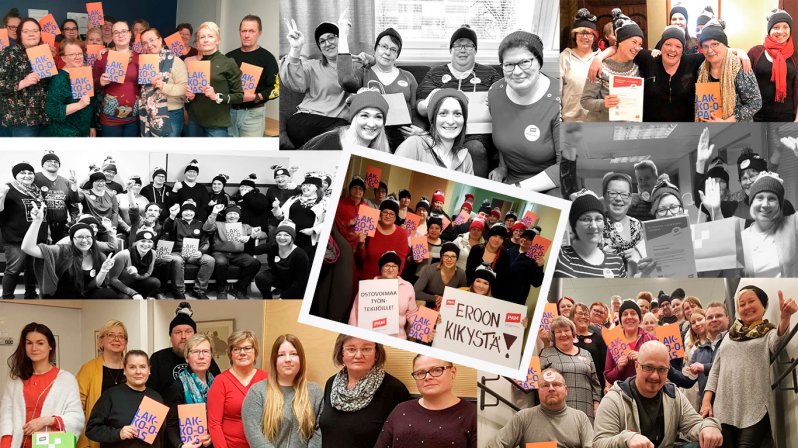7 questions and answers about the strikes – Some basics you should know
If no result is reached in the collective agreement negotiations, strikes will begin in the facility services sector Tuesday 18 February. We put together seven key points about the strikes.
1. Who can call a strike?
Strikes are called by trade unions. Individual employees cannot decide to go on strike by themselves. The trade union generally pays strike pay to those who are on strike. Employers are not entitled to discriminate against striking employees after the strike is over. A trade union can call a legal strike if it wants to influence the employers’ federation to conclude a collective agreement. A strike can be limited geographically or in time or it can apply to the entire agreement sector.
2. Is it legal to go on strike?
A strike is legal industrial action. Under the Finnish constitution, citizens have the right of association and assembly and the right to strike. The parties to the collective agreement have agreed on the minimum level of working conditions in the sector and on good labour relations. Once PAM’s Executive Committee has terminated the collective agreements and the collective agreement period ends, a state of non-agreement begins and the obligation of good labour relations also ends.
3. Why did PAM call strikes in the facility services sector?
In collective agreement negotiations the aim is always to find a solution through negotiation. Negotiations have been held in the facility services sector in January with no result. A strike is never undertaken lightly, but there was no other way. By going on strike we are trying to secure working hours and pay that employees can live on. It is also important for us to get rid of the unpaid extra hours brought in by the Sipilä government under the competitiveness pact.
4. Who will be affected by the strikes and when will they start?
Strikes will start in the facility services sector in week 8 in Lapland, Northern Ostrobothnia, Kainuu, Central Ostrobothnia, Ostrobothnia, Southern Ostrobothnia and Central Finland.
Check the exact dates and times and the strike locations in the facility services sector here.
5. Who can apply for strike pay and how much is it?
Strike pay is paid to those trade union members who would have had a working shift of at least 4 hours during the strike and who suffer loss of earnings as a result. Strike pay in the retail and facility services sector strikes is 100 € (66.40 €) per strike day for which there has been loss of earnings. Strike pay is tax-free up to 16 euros, after which tax is withheld. This means that for strike pay of one hundred (100) euros a member is paid 66.40 euros.
Strike pay is applied for with a form at pam.fi/lakko. The form will be opened on the website on the first strike day, 18 February. Union membership fees must be paid up for strike pay to be paid. Strike pay is paid within around one week after the application has been made. Payment takes longer for members of other unions, because membership and payment of membership fees have to be checked from the other union.
To complete the strike pay form you need your personal identity code, your address, your account number (in IBAN forma) and your workplace details. You don’t need to send your tax card to PAM.
N.B. Strike pay is not paid to YTK members.
6. What about collective agreement negotiations in other sectors?
During spring 2020 PAM will negotiate collective agreements for around 400,000 employees in service sectors. Collective agreement negotiations will be conducted for different sectors at different times depending on when the previously agreed collective agreement is valid until.
Collective agreements expiring in 2020:
31.1. Commercial sectors (retail sector, retail ICT employees, Hankkija-Maatalous sales staff, warehouse and transport supervisors, retail supervisors), facility services sector, Alko, Finnish National Opera and Ballet technical small groups and technical supervisors and experts, Veikkaus Oy (together with the Finnish Electrical Workers' Union)
29.2. Bingo sector, cinema sector, copying and printing sector, household appliances and equipment servicing and service machine sector, photofinishing lab sector, removal service sector, customer service sector
31.3. Hotel, restaurant and leisure industry – supervisors, hotel, restaurant and leisure industry – employees, Avecra, amusement, theme and adventure park sector, pharmacy sector, Finnish National Theatre technical and administrative (with Trade Union for Theatre and Media Finland Teme
30.4. Private security sector
Follow the collective agreement negotiations in your sector here.



